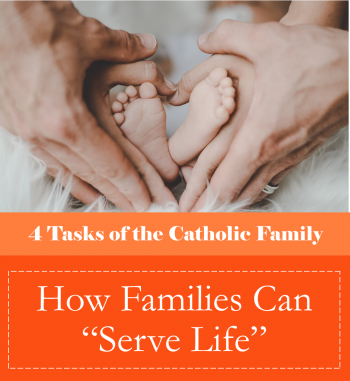
4 Tasks of the Catholic Family Series
- Build Your Community of Love
- How Families Can “Serve Life” (this article)
- How Families Can Change Society
- How Families Can Serve the Church
***
In this article series, I’m exploring the four tasks of the Catholic family as John Paul II outlined them in Familiaris Consortio. These four tasks clarify how we can express and live our identity and mission as Catholic families. Last time, I explained the first task: building our families into a community of love. Today, let’s unpack our second task: serving life.
Our Second Task: Serve Life
As we read this section of Familiaris Consortio, we quickly learn that for our families to “serve life” means more than to be pro-life or anti-euthanasia. We serve life not only by protecting human life from conception until natural death, but also by resisting cultural trends that devalue humanity, by fostering family virtue, and by contributing to the intellectual, emotional, and spiritual formation of children.
Welcome Children

John Paul II affirms and restates the Church’s long teaching on procreation, encouraging parents to be open to life, eschewing artificial birth control. He explains that parents share in God’s creative power when they cooperate with God in transmitting the gift of human life and protecting and nurturing it.
Couples serve life when they practice natural family planning (“NFP”) instead of using artificial birth control. NFP recognizes fertility as a gift to be cherished, not a problem to be eliminated. The Church’s firm position on artificial birth control is seen as sour and old-fashioned today, even by many Catholics, but this doesn’t mean it’s wrong. The Church has always rejected artificial birth control, and for centuries it was accepted as common sense. Only in recent decades has it been viewed as a hard or controversial teaching. Even mainline Protestant churches rejected artificial birth control until the mid-20th century. Martin Luther, John Calvin, John Wesley, and Ulrich Zwingli all condemned it.
We can certainly space children and take into account age, health, and finances when deciding whether to have another child, and NFP is a natural, effective way to space or avoid pregnancy. NFP programs teach couples the many benefits of NFP, how to practice it, and how to discern their family size. An encouraging and under-reported fact: couples who practice NFP rarely divorce! But it’s not surprising. NFP reminds us of the dignity of marriage and our parenting vocation. It also encourages communication between husband and wife as they consider together the most important decision they will ever make: whether to have a baby who will come into their lives destined for heaven, bringing his or her gifts, vision, and talents to the world on his way to that destination!
Welcome the children of other families. We serve life when we “respond generously to the children of other families, giving them support and love not as outsiders but as members of the one family of God’s children” (FC 41). Some children will never experience the warmth and acceptance of Christ except within our own homes. Married couples might consider expanding their families and extending their loving protection to orphaned and abandoned children:
Rediscovering the warmth of affection of a family, these children will be able to experience God’s loving and provident fatherhood witnessed to by Christian parents, and they will thus be able to grow up with serenity and confidence in life. At the same time, the whole family will be enriched with the spiritual values of a wider fraternity (FC 41).
In my own circle, I have several friends who have adopted and fostered children. I’ve seen the long (sometimes painful) journey between considering fostering/adoption, making the decision to pursue it, and then actually doing it. My husband and I are open to fostering a child, but we have not pursued it actively. I know we have to exercise prudence when we have children already at home. I wonder whether I would have the emotional and financial resources to give to the children I already have, in addition to the fostered children. This is a question I can’t avoid or pretend doesn’t matter, but this section of Familiaris Consortio reminds me that the question of expanding my family through fostering and adoption is a question I similarly shouldn’t avoid or pretend doesn’t matter.
At the very least, all Christian families can support local foster and adoption agencies in addition to friends who foster or adopt.
Foster Family Virtue
Serving life goes beyond procreation (FC 28); we are called to nurture our children “in a family atmosphere so animated with love and reverence for God and others that a well-rounded personal and social development will be fostered among the children. Hence, the family is the first school of those social virtues which every society needs” (FC 36). Christian parents model the virtues for their children by their patience, humility, love, and forgiveness. Parents lead their children in cultivating a virtuous life through lessons in empathy, the works of mercy, resolving conflict with siblings, sharing their gifts with others, and expressing gratitude to God for the gifts they enjoy.
In a society that has lost its way in so many ways, we must protect our children from the narcissism that is damaging so many young people, particularly through social media. We can guide our children in understanding their purpose in the world and what it means to be a decent human being. Their purpose isn’t to be a popular Instagram girl or a famous gaming guy. Their purpose is to transform the world through Christ’s love and to live out their unique mission in the Church.
Live simply. I am struck by John Paul II’s advice to us to avoid the trap of materialism.
Children must grow up with a correct attitude of freedom with regard to material goods, by adopting a simple and austere lifestyle and being fully convinced that man is more precious for what his than for what he has (FC 37).
I hadn’t thought of it this way, but he’s right: living simply serves life! Consumer culture devalues our humanity and leads to emptiness. Most of us grew up with aggressive marketing tactics that targeted children, but at least our parents were usually around to deflect or intercept the marketing. Our children are targeted in secret through apps, games, and pop-ups; they’re even targeted while at school!
We know from attachment research and modeling that consumerism can become a kind of substitute attachment luring some children away from healthy attachments to their grown-ups (parents, teachers, church leaders). These children replace their yearning for love with seeking to own and hoard objects. But things can never satisfy the longing of our hearts; we want our children to know this. We serve life when our homes are filled with an abundance of love rather than piles of stuff!
Provide and Protect Real Education
We serve life by providing our children with a real education. Real education isn’t about cramming information into a kid’s head; it’s about shaping his mind, character, and heart so he can understand and reach his true end, which is beatitude in heaven. A real education shapes a child’s recognition and hunger for the good, the beautiful, and the true.
The Church has always taken the role of parents in educating their children very seriously. Parents are the primary educators of their children, not the state. The role of the state is to enable and empower parents in their mission of educating children; the state does not replace the parents.
The Church’s position contrasts with current attitudes and practices in my own home state of California which has overstepped its constitutional boundaries, undermining parental authority. Here, frequently parents are not permitted to view materials used in the classroom let alone question them; parents cannot legally opt their children out of objectionable, disturbing lessons on sexuality. I could never send my children to a public school in California; I’m not willing to risk my children’s souls. I imagine many parents are dealing with similar issues in their own states.
As a way of serving life, John Paul II urges us to resist any corrupt or erroneous teaching in our children’s classrooms. If government attempts to indoctrinate children with false ideas and ideologies opposed to the Faith, parents have a duty to challenge this teaching and join with other families in protecting their children.
If ideologies opposed to the Christian faith are taught in the schools, the family must join with other families, if possible through family associations, and with all its strength and with wisdom help the young not to depart from the faith. In this case, the family needs special assistance from pastors of souls, who must never forget that parents have the inviolable right to entrust their children to the ecclesial community (FC 40).
My family has always homeschooled, so we’ve avoided the front line battle with our school system for the most part, but I still care about the well-being of children whose parents have no choice but to send them to local public schools. Most of these parents can’t afford to send their children to private schools. Catholic social teaching has long held that governments shouldn’t make it too burdensome for families to send their children to religiously-affiliated schools. School vouchers should be available for parents who want to send their children to private schools, including religious schools.
If we can’t expand school choice, how radical would it be if Catholic parents joined forces and said NO to the school system? Just NO. What if we think outside the box and find new, unexplored options? What about diocesan-sponsored homeschool cooperatives? What about two families sharing homeschooling responsibilities so all the parents can work? What about two or three families hiring one tutor to homeschool all their children, like a tiny schoolhouse model? Exciting prospects!
Well, we’ve only made it through two of the four tasks of the Catholic family, and I feel like I already have plenty to think about. But two more tasks to go! Next time, we’ll contemplate our third task as Catholic families: participating in the development of society.
Resources
Familiaris Consortio with Commentary
Not by Nature but by Grace: Forming Families through Adoption by Gilbert Gilbert Meilaender.
Couple to Couple League. My favorite resource for natural family planning. Articles, training.
Natural Family Planning: The Complete Approach by John and Sheila Kippley. A guide for Catholic couples who want to practice NFP.
The End of Education: Redefining the Value of School by Neil Postman. Powerful and thought-provoking. “Postman suggests that the current crisis in our educational system derives from its failure to supply students with a translucent, unifying narrative like those that inspired earlier generations. Instead, today’s schools promote the false gods of economic utility, consumerism, or ethnic separatism and resentment.”

